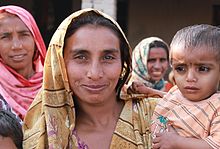Pakistani women

A Pakistani woman with child
|
|
| Gender Inequality Index | |
|---|---|
| Value | 0.536 (2014) |
| Rank | 121st out of 157 |
| Global Gender Gap Index | |
| Value | 0.556 (2016) |
| Rank | 143rd out of 144 |
The status of women in Pakistan is one of systemic gender subordination even though it varies considerably across classes, regions, and the rural/urban divide due to uneven socioeconomic development and the impact of tribal, feudal, and capitalist social formations on women's lives. The Pakistani women of today do, however, enjoy a better status than the past.
Almost all religious groups often quote the Quran and advocate subordination of women in Pakistan. Even rape victims have not been allowed to use DNA evidence to prove their cases, however the All Pakistan Ulema Council recently issued fatwas denouncing "honour killings". Other improvements are also being made as Lahore has inaugurated its first service of lady traffic wardens to manage the traffic and the country's most conservative province, Khyber Pakhtunkhwa, is planning to increase the percentage of women in the police force.
Even with these improvements, rampant domestic abuse and a high rate of child marriages and forced marriages still remain. Pakistan is currently one of the most dangerous countries in the world for women.
Pakistan has a dual system of civil and sharia law. The Constitution of Pakistan recognizes equality between men and women (Art. 25(2) states "There shall be no discrimination on the basis of sex") but also recognizes as valid Sharia law (Chapter 3A. – Federal Shariat Court).
Historically, Muslim reformers such as Syed Ahmad Khan tried to bring education to women, limit polygamy, and empower women in other ways through education. The founder of Pakistan, Muhammad Ali Jinnah, was known to have a positive attitude towards women. After the independence of Pakistan, women's groups and feminist organisations started by prominent leaders like Mohtarma Fatima Jinnah started to form that worked to eliminate socio-economic injustices against women in the country.
...
Wikipedia
